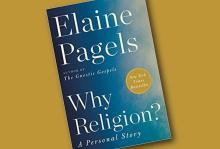personal story

FORTY YEARS AGO, in 1979, Princeton University professor Elaine Pagels won the National Book Award for her groundbreaking (and best-selling) first major nonacademic book, The Gnostic Gospels. In it, Pagels lucidly described the history of a little-known early Christian sect, the Gnostics, who believed everyone had a “divine spark” within them and that with some contemplation everyone could make their own connection to God, a belief that was abhorred by more orthodox Christians. In 367 C.E., Athanasius, the bishop of Alexandria, ordered monks in Egypt to reject “illegitimate and secret books,” including Gnostic writings.
What makes Pagels’ latest book, Why Religion?: A Personal Story, impossible to put down is the way she interweaves her now 50-year study of the Gnostics with her own personal story. Over the years, she has described the profound losses—one year apart in the late 1980s—in her own life. First, the death of her 6-year-old son, Mark, from a rare pulmonary disease. Second, the death of her husband, Heinz, who fell into a 1,300-foot ravine while hiking in Colorado. Pagels’ newest account is much more detailed and painful than earlier summaries, stunningly raw, almost as though writing about recent events.
The entire ordeal made Pagels feel “as though she was being burned alive.” She had been raised as a Protestant, but her father, a biology professor at Stanford, thought religion passé. To get through these times, Pagels relied on friends, two newly adopted children, Trappist priest Thomas Keating (a teacher of contemplative practices, including centering prayer), and the rituals of a nearby Episcopal church.

At a church workshop last week, I set aside my carefully planned teaching and just let people talk.
It became clear that everyone had an old story they needed to tell. Until it was heard, no one in the room could or would move on to thinking about the future. And even when it was heard, half of them would keep cycling back to the old story.
I sensed that, for some, the old story contained an identity, in the sense of “this story is who I am.” I need to keep telling this story so that you know me. Until I am sure you’ve heard it, know me, and accept me, I can’t stop.
For some, the old story was the burden on their back, the cloud over their heads. This story explains why I fall short, seem hesitant or even paralyzed. If you know my story, maybe you can accept me and forgive me.
For some, the old story was the safe place, the known that kept the scary unknown at bay. As long as I keep telling this story and presenting the me that existed yesterday, I don’t have to contemplate the ways I am changing and the tomorrow that worries me.
It was like a case study in the long-ago classic, “I’m OK — You’re OK.” People wanted to know they were OK — acceptable and maybe someday even loved.
I think back to a recent lunch with the rector of the local Episcopal church, where I kept peeling the onion, telling her one thing about myself and then, if she accepted that, telling her something more. She was doing the same. If we know each other and still accept each other, then we can be in relationship.
In the wake of the tragic bombing in Norway this past weekend, we are left with an unsettling picture of the state of anti-Islamic sentiments in the United States. There were broad attempts to blame the bombings on Islamic terrorism before all of the facts of the attack were out, and even after the attacker became known as Anders Behring Breivik, a self-proclaimed Christian extremist, the discussion focused on Breivik's statement that he was responding to the threat Muslims pose in Europe.
Glenn Beck has received a lot of attention for his inflammatory rhetoric lately. Recently, he shared a personal story about his daughter who has cerebral palsy, which gets to the heart of his fears about health-care reform: